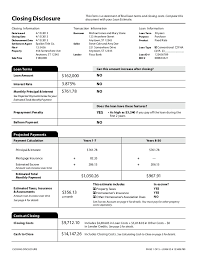 As stated in a prior post , we promised to keep you advised of the progress of intended updates to the mortgage disclosure regulations. Due to comments from the loan industry, the effective date of the regulations was pushed back from August 1 to October 3, 2015. The delay in the implementation allowed for certain revisions to the intended regulations and allowed for the loan industry to engage in the task of preparing to close loans consistently with the new regulations.
As stated in a prior post , we promised to keep you advised of the progress of intended updates to the mortgage disclosure regulations. Due to comments from the loan industry, the effective date of the regulations was pushed back from August 1 to October 3, 2015. The delay in the implementation allowed for certain revisions to the intended regulations and allowed for the loan industry to engage in the task of preparing to close loans consistently with the new regulations.
If you are applying for a residential mortgage after October 3, 2015, these revisions will apply to your loan. Within three business days after your loan application is submitted, a Loan Estimate is to be provided to the borrower. This document will provide the loan amount, interest rate, monthly payment, estimated taxes and insurance and anticipated cash required to close.
The major concept behind the new regulations is that additional charges to the borrower of any type are not to be disclosed for the first time at the closing. Collection and sharing of accurate data concerning charges among those professional partners involved in the closing is crucial. Also, attorneys in New York will need to get accustomed to preparing the final financial details of closings much more in advance than is currently typical. Those attorneys who do not conduct many real estate closings may not be abreast of these developments and may not be prepared to act.
 New York Real Estate Lawyers Blog
New York Real Estate Lawyers Blog


 As we enter the last days of summer,
As we enter the last days of summer, It is not unusual for the estate of a deceased person to hold stock as an asset. Stock can take the form of shares held in a publically traded company, such as Target, or shares in a cooperative corporation. Clients often ask
It is not unusual for the estate of a deceased person to hold stock as an asset. Stock can take the form of shares held in a publically traded company, such as Target, or shares in a cooperative corporation. Clients often ask 
 One of
One of Parties to real estate transactions often ask
Parties to real estate transactions often ask  Our readers who have attended residential real estate closings are familiar with the
Our readers who have attended residential real estate closings are familiar with the  In the New York metropolitan area, the residential real estate market is often seasonal. During the holidays between Thanksgiving and New Years Day, most sellers do not list their properties for sale or may remove their home from active listing status. During the winter months, most buyers are reluctant to be exposed to the cold weather and the snow to view properties. Fortunately, all of this changes with the approach of spring. The inventory of homes increases as more properties are listed and additional purchasers are looking to enter transactions. Both parties to transactions, who will experience increased competition as inventory increases, should take the steps described in this post so as not to miss the spring season.
In the New York metropolitan area, the residential real estate market is often seasonal. During the holidays between Thanksgiving and New Years Day, most sellers do not list their properties for sale or may remove their home from active listing status. During the winter months, most buyers are reluctant to be exposed to the cold weather and the snow to view properties. Fortunately, all of this changes with the approach of spring. The inventory of homes increases as more properties are listed and additional purchasers are looking to enter transactions. Both parties to transactions, who will experience increased competition as inventory increases, should take the steps described in this post so as not to miss the spring season. Many people who pass away also leave behind the place in which they resided. The housing could be a rental apartment, a cooperative or condominium unit, or a house. The deceased may not necessarily have resided in the property immediately before death if they went to assisted living or a nursing home. This blog post will address the legal and practical matters arising from housing of the deceased.
Many people who pass away also leave behind the place in which they resided. The housing could be a rental apartment, a cooperative or condominium unit, or a house. The deceased may not necessarily have resided in the property immediately before death if they went to assisted living or a nursing home. This blog post will address the legal and practical matters arising from housing of the deceased. Many parties to real estate transactions focus not only on the house or the
Many parties to real estate transactions focus not only on the house or the